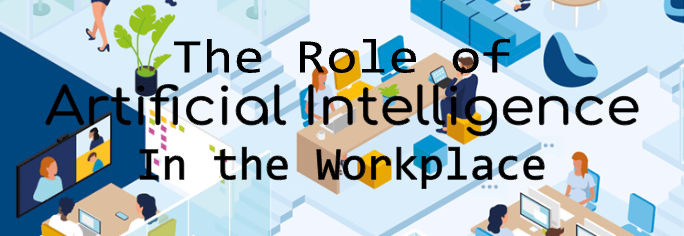The role of Artificial Intelligence in the workplace
March 2, 2023
Artificial intelligence (AI) has become a buzzword in recent years, and its presence in the workplace is controversial to say the least. AI is increasingly being utilized in various industries, from healthcare to customer service. Supporters say that if used properly, AI has the potential to increase efficiency, accuracy, and productivity by automating repetitive tasks, which makes it attractive to both businesses and employees. However, critics argue that AI will cause a massive rise in unemployment, and that AI systems may be biased or discriminatory based on the data with which its creator programed it with.
Advantages of AI in the Workplace
One of the main advantages of AI in the workplace is the increased efficiency it provides workers. AI can automate repetitive and time-consuming tasks, allowing employees to focus on tasks that require critical thinking and creativity. This inevitably leads to increased productivity and revenue for businesses, as well as smaller work loads for employees. Additionally, AI can provide valuable insights and data analysis that can inform decision-making processes.
Disadvantages of AI in the Workplace
The main concern posed against AI being employed in the workplace is the job displacement it will cause. As AI continues to automate tasks, many jobs may become obsolete. PricewaterCoopers claims that one third of all employment will be at risk of being automated by the mid 2030’s, employees with low levels of education being the most at risk. What these critics fail to consider is that the revenue the businesses save in payroll they will most likely use to expand their industries, offering higher paying positions for these workers to fill. Additional concerns include the ethical concerns surrounding the use of AI, such as employee privacy and the potential for AI to replicate, reinforce, or amplify harmful biases. AI is only as impartial as its data, and as long as accurate and impartial data is given to the algorithm, biases shouldn’t be an issue. However, humans are notoriously biased regardless of data. If forced to choose between a biased judge, and a potentially biased judge, any sane person would choose the potentially biased judge. Privacy on the other hand, is a serious and ongoing issue that will only be solved when laws are made against the exploitation of user data.
The Future of AI in the Workplace
Despite these concerns, the use of AI in the workplace is going to continue to grow. As AI technology advances, it will become more sophisticated and capable of handling more complex tasks. While this will cause some unemployment, it has the potential to create new job opportunities in fields such as AI development and maintenance. As for the issue of privacy, data has been stolen from consumers long before AI was employed to do so. If the citizens continue to do nothing businesses will continue to exploit consumer data for their own gain. in order for this issue to be solved citizens must put forth massive economic and political pressure on businesses and government to put a stop to this practice.
While AI has the potential to revolutionize the workplace and increase efficiency, it also raises concerns about job displacement and ethical concerns. As AI technology continues to advance, it will be important for businesses to carefully consider the impact of AI on their employees and ensure that it is used responsibly. By doing so, we can harness the benefits of AI in the workplace while minimizing its potential negative impact.



